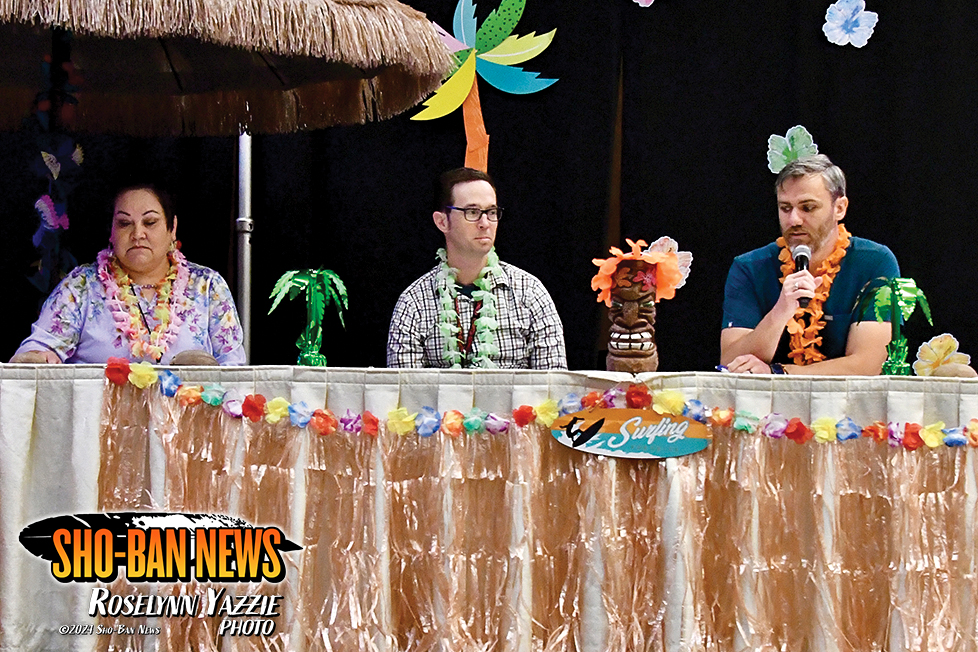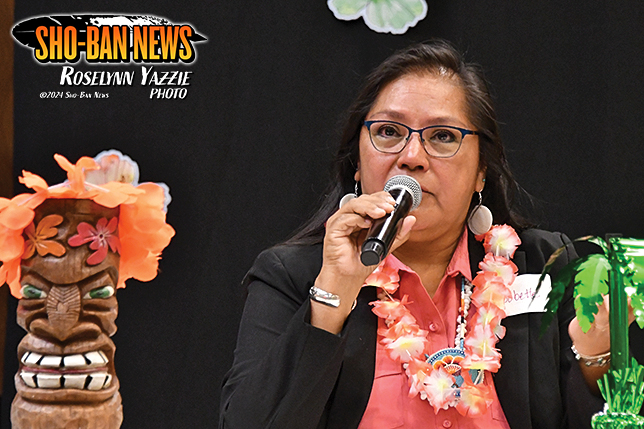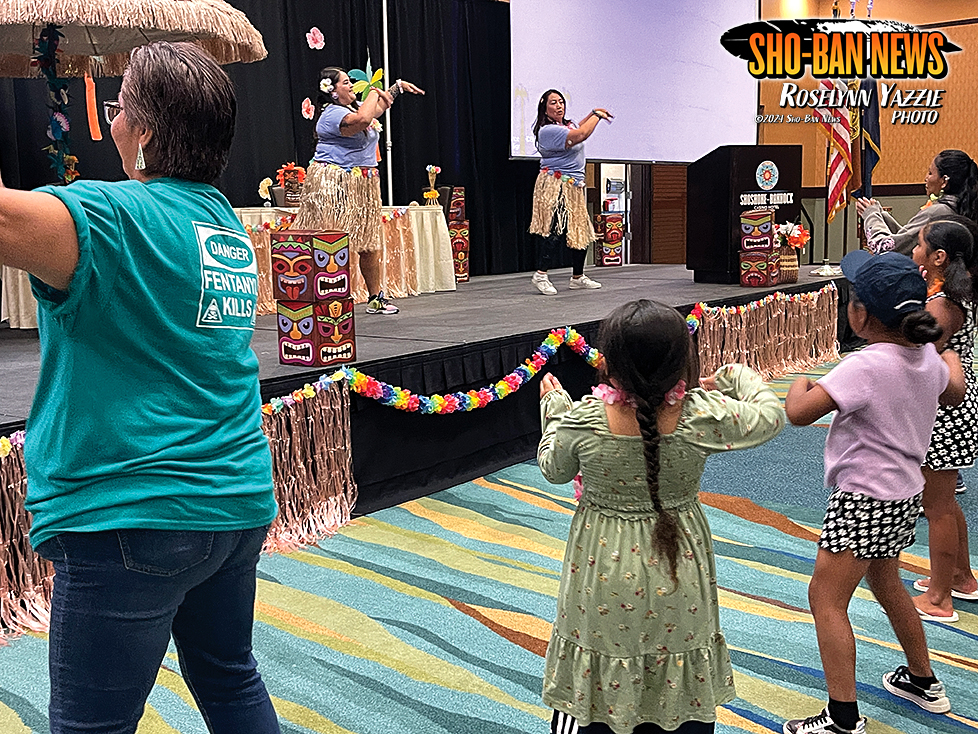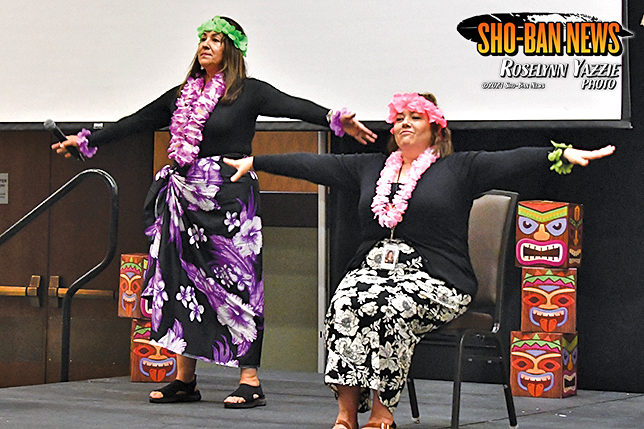Day one of THHS Wellness Retreat targets prevention education

“Embrace Your Journey of Wellness” panel featuring (from left) Patient Navigator Nancy Wahtomy, Dr. Bussell, and Dr. Comish at the Wellness Retreat on June 25.
By ROSELYNN YAZZIE
Sho-Ban News
FORT HALL — The Shoshone-Bannock Tribal Health & Human Services hosted a Wellness Retreat to promote “Living in balance” on June 25 and 26 at the Shoshone-Bannock Casino Hotel.
The tropical theme was set upon arrival as attendees were greeted at registration and presented with a bag and flower lei.
The opening ceremony included the Fort Hall Veterans Organization posting colors and singing from Ghost Canyon.
Tribal Youth Education Manager Jessica James was the emcee, who called upon Fort Hall Business Council Chairman Lee Juan Tyler to offer the prayer.
Miss Shoshone-Bannock Develynn Hall gave a welcome and talked about how wellness means something to everyone individually and how she’s working on spiritual wellness.
THHS Director Travis Martin said he appreciated everyone who could attend. He thanked the staff for their work in pulling the event together and hoped everyone could encourage their loved ones to participate and learn about healthy ways of living. He emphasized the importance of eating healthy and staying active.
The first day focused on prevention education with the morning session including presentations “Learning from Our Elders, Healing Ways of the Past” by tribal member Bobette Haskett and “Embrace Your Journey of Wellness” by Women’s Health & Men’s Health panel with Dr. Comish, M.D., Dr. Bussell, M.D. and Patient Navigator Nancy Wahtomy.
Learning from Our Elders, Healing Ways of the Past
Haskett’s presentation included her personal stories and what is known from being carried on by Indigenous people through the centuries.
“We’re still holding on to teachings and practices that we use today to help us to learn, and grow, and be healthy,” she said.

Bobette Haskett talks about “Learning from Our Elders, Healing Ways of the Past.”
She spoke of her late mother who went through trying times in her life, specifically with the loss of two young children. She had a history of depression and anxiety, which only added to the pressure. Haskett was always amazed at how she got through it, even though she coped with alcohol and eventually passed from cirrhosis in her 40s.
Haskett said there’s so much going on in women’s lives and commended them for their resilience and strength. Something she has dealt with is being diagnosed with diabetes but is dedicated to live healthy to enjoy her grandchildren.
As someone who uses Facebook regularly, Haskett is astonished to see what other people are doing to make a better life for themselves and live healthily. As a gagu, she cherishes her time because it’s something her mother didn’t get to do.
She said archaeologists are fascinated with how our ancestors lived, by what they accomplished, how they traveled, made use of the land, their tools, and were innovative. Haskett realized ceremonies and rituals played an important role for men and women.
Before the white men came the people lived off what the land provided and practiced naturalism. They learned through years of experience how to use plants, natural resources, and animals. They took care of one another and cared for all of their community. She said today people are more individualistic.
She encouraged people to help one another and work together to share culture and knowledge. She does that in her own life with her husband, Russell, and their family. They go on many adventures and share by posting on social media. She highlighted the importance of family and travel.
She said one can learn by observing other tribal ways with respect.
Haskett said spirituality and prayer are important as it all comes down to connecting with the Creator.

Zumba instructors get the crowd moving during the lunch break.
Embrace Your Journey of Wellness
The panel was moderated by Community Health Services Manager Elizabeth Moss, who asked the professionals a series of questions concerning preventative care.
What does it mean to be up to date in preventative health care?
Dr. Comish said the more often one sees their provider the more up-to-date they are. It was suggested that for most, one should see the doctor yearly, but more often as they age and if they have certain risk factors, or have already been diagnosed with certain medical conditions as new information is always coming out.
Wahtomy said as Patient Navigator she can find resources to help people get to their appointments.
Dr. Bussell said babies need their first initial year of wellness checks. He stressed immunizations need to be kept up to date for young people as they come into high school. Adults should also stay current on immunizations.
What health screenings are recommended at various ages on health?
Screenings can be done for mental health.
For women at age 21, get up to date on a cervical cancer screening, which is done with a pap smear. Repeat every three years and at the age of 30 extend to every five years. Cervical cancer is one of the top three leading causes of death in women. The HPV vaccine at age 11 can help prevent that.
Bussell added toddlers from one to two years old can be screened for anemia and lead.
At age 35 one can be screened for diabetes.
At age 55 smokers can be screened for lung cancer with a CT scan.
At age 65-75 its recommended a one-time screening of abdominal aortic aneurysm.
A PSA test is recommended around age 50 for prostate cancer in men.
Just to name a few.
Wahtomy said early detection screening is very important as she works with several folks who have passed away from cancer and wanted to share with people to get their tests done.
Cologuard is the new screening for colorectal cancer offered at IHS, as a third option screening.
Mammograms are vital for breast cancer detection which can also go back to family history. Because early detection is key the doctors said the patient should do all they can to follow up.
They also recommended people make sure to ask their providers questions and to learn about their health. Moss said patients should empower themselves and be in control of their health.
When should an individual seek advice from a medical professional?
When there are changes such as incontinence, vision changes, hearing loss, and weight gain, although all of them occur in normal growing patterns people should be aware of their bodies when they notice something is different.
Comish talked about menopause and changes in women as a result of losing estrogen.
One can experience symptoms like hot flashes, mood swings, loss of libido, loss of sleep, and bone density thinning. If these symptoms are too much hormone replacement therapy is an option and is considered safe to prevent symptoms. Menopause can start as early as age 45 or 52, beginning with a change in the menstrual cycle. There is no specific lab to diagnose menopause but watch for signs.
While aging is a natural process and can’t be stopped, one can control how they age. Bussell talked about anti-aging medicine that can be used if there are parts of aging impacting your quality of life. He said men, make sure you see your doctor if you notice urinary frequency at night time, low testosterone, and cataracts.
He said the best way to age healthily is to start early with physical activity, eating plant-based foods, and following up with screenings.
Know family histories. One can’t change their DNA but can take certain steps to avoid becoming diabetic or developing another chronic condition. One should avoid things known to cause cancer, like smoking, poor diet, avoid red meat, use olive oil, drink plenty of water, and have a basic level of activity because weight gain can result in a loss of mobility.
“The less you move the sooner you die. Be active as much as you can, even 5-10 minutes a day can help preserve you at your best,” said Bussell.

Ann Jim and Erin Brownley show different stretching techniques, which are beneficial to
mobility.
Genetic screening is also available, make sure to tell the doctor if you had a first-degree relative who had certain cancers. Maintain a healthy weight. Obesity is tied to heart problems and joint problems. Know your risk factors, especially if you have things like high cholesterol, remember to ask questions, and manage stress and anxiety.
Wahtomy shared a story of a patient who found out they had colon cancer. She said the topic is something Natives don’t like to talk about, which needs to change. She said to tell your families you have it because they may be at risk too.
What about folks already living with chronic conditions, what can they do to help themselves?
Work with the doctor. Educate yourself, especially when it comes to knowing what your medications are. Bussell said once someone gets to the chronic disease stage, make sure to adhere to medication specifications, and also keep up on vaccinations, because if one has a chronic health condition a virus or bacteria may send them over the top. Smoking and alcohol make it hard to better the condition as well.
Wahtomy said she can help with medication education and can assist them in managing their health care.
When wrapping up the panel, Moss said, “We like to see you when you’re feeling well and not just when you’re not feeling well.”
Activities that got the crowd moving included Health Education’s Ann Jim and Erin Brownley doing stretching exercises during a break, and during lunch, Zumba instructors gave a demonstration.
The second day was dedicated to community involvement, highlights include a wellness walk, a Hawaiian Buffet, more presentations, and door prizes.





